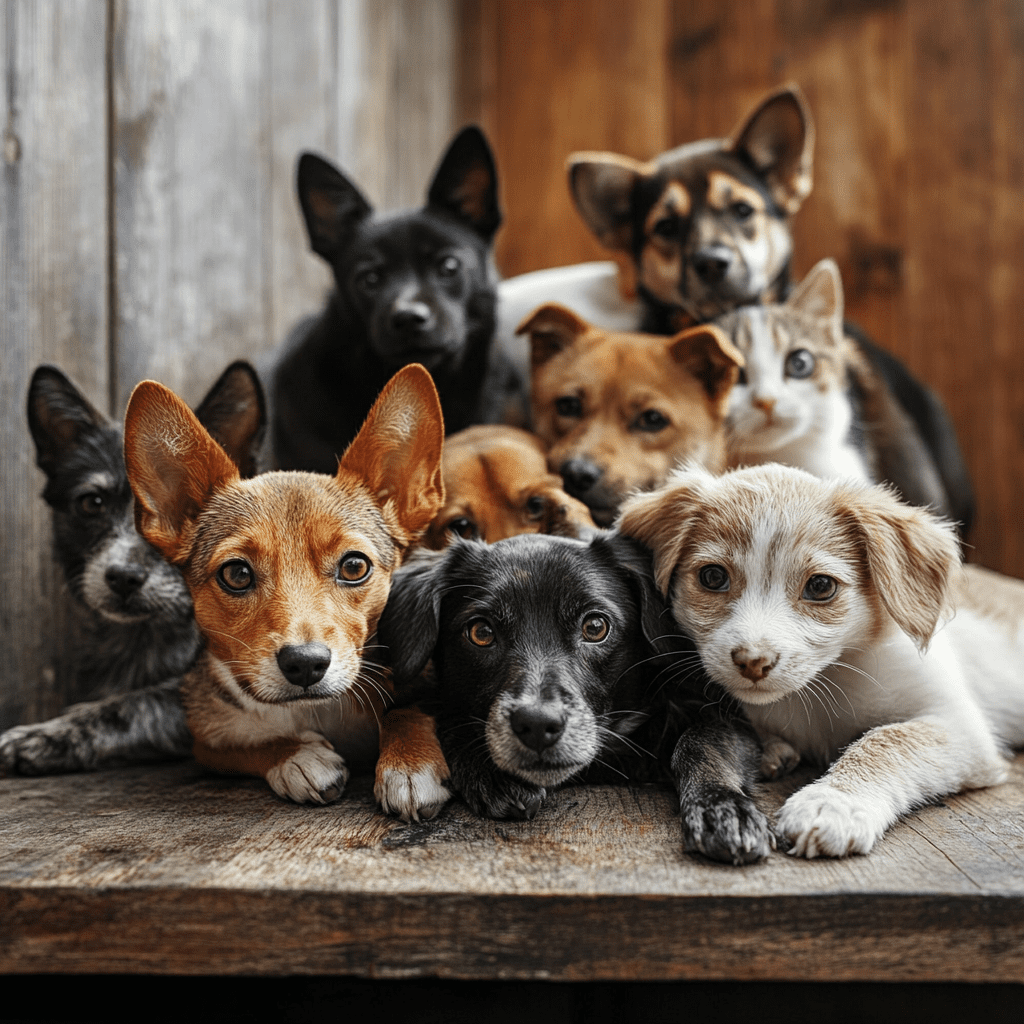Disclosure:
Some of the links on this website are affiliate links, which means that if you click on one of the links and sign up or make a purchase, we may earn a small commission at no additional cost to you. This commission helps support the maintenance and operation of this site.
We only recommend products or services that we believe will provide value to our readers. Our opinions and recommendations are based on our own research and experiences, and we strive to offer honest and unbiased content.
Please note that your support through these affiliate links is greatly appreciated, as it helps us continue to provide quality content and resources.
Thank you for your support!
The pet industry is booming, with millions of pet owners eager to invest in high-quality care, products, and services for their furry friends. Whether you’re passionate about pet care services, retail, photography, or pet health, there are numerous opportunities to turn your love for animals into a profitable business. From offering dog walking and grooming to selling organic pet food and custom pet accessories, a pet-related business allows you to cater to a growing market while doing something rewarding. If you’re looking to start a flexible, passion-driven business, the pet industry might be the perfect fit!
What is a Pet-Related Business and Why You Should Start One?
What is a Pet-Related Business?
A pet-related business is any business that provides products or services for pets and their owners. This industry covers a wide range of services, including pet care, pet health, pet retail, and pet photography.
Some common pet-related businesses include:
- Pet Care Services: Dog walking, pet sitting, pet grooming, and pet training.
- Pet Retail: Selling pet food, accessories, toys, or custom pet furniture.
- Pet Photography & Videography: Pet photoshoots, social media content creation.
- Pet Health Services: Pet chiropractic care, alternative pet medicine, and dog fitness centers.
With the pet industry booming, more entrepreneurs are finding profitable opportunities to serve pet owners who are willing to spend on their pets’ well-being.
Why You Should Start a Pet-Related Business
1. Growing & Profitable Industry
The global pet industry is worth hundreds of billions and continues to grow. Pet owners are spending more on premium products, health care, and personalized services for their furry friends.
Opportunity: Pet businesses can generate steady revenue with high-profit margins, especially in niche markets like organic pet food, luxury pet services, and pet wellness.
2. Passion-Driven Business
If you love animals, this is the perfect business for you! Many pet business owners start because they are passionate about pets and enjoy working with animals every day.
Why it matters: Running a pet business is more fulfilling when you genuinely care about the well-being of pets.
3. Flexible Work Options
Many pet-related businesses offer flexible working hours and remote work options. You can choose to work full-time or part-time, depending on your schedule.
Examples:
- Dog walkers & pet sitters can set their own schedules.
- Pet retail & e-commerce can be managed from home.
- Pet photography & content creation allows remote work.
4. Multiple Revenue Streams
A pet business can generate multiple income streams, increasing profitability.
Example: A dog groomer can also sell shampoos, pet accessories, and grooming tools.
Example: A pet photographer can offer photo sessions, prints, and social media content creation.
This makes a pet business more stable and scalable over time.
5. Pet Owners Are Loyal Customers
Pet owners return regularly for services like grooming, training, and pet-sitting. If you provide high-quality service, you can build a loyal customer base that brings repeat business and referrals.
Fact: Many pet owners spend more money on their pets than on themselves, ensuring consistent demand for pet-related products and services.

Pros and Cons of Starting a Pet-Related Business
The pet industry is thriving, with millions of pet owners willing to spend on pet care services, retail products, health treatments, and even pet photography. While launching a pet-related business can be highly rewarding, it comes with challenges and risks as well. Below, we’ll explore the pros and cons of starting a pet business based on the provided categories:
Pros of Starting a Pet-Related Business
1. Growing Market & High Demand
Why it’s a pro:
- The pet industry is worth billions of dollars and continues to grow.
- More people consider pets as family members, increasing demand for premium services and products.
Example:
- Dog walking and pet sitting services are always in demand as pet owners return to work or travel.
- Organic pet food and accessories are growing in popularity due to health-conscious pet owners.
2. Passion-Driven Business
Why it’s a pro:
- If you love animals, working in a pet business won’t feel like work.
- You get to interact with dogs, cats, and other animals daily.
Example:
- Pet trainers and groomers often start because of their love for pets.
- Pet photographers enjoy capturing special moments between pets and their owners.
3. Flexible Work Options
Why it’s a pro:
- Many pet businesses allow flexible work hours and remote work.
- You can run your business full-time or part-time based on your schedule.
Example:
- Pet sitters and dog walkers can set their own schedules.
- Pet retail (e-commerce) can be managed online without a physical store.
4. Multiple Revenue Streams
Why it’s a pro:
- You can offer multiple services or products to increase profits.
- Pet owners are loyal customers and will return for ongoing services.
Example:
- A dog groomer can also sell pet shampoo and brushes for extra income.
- A pet trainer can offer online courses and in-person lessons.
5. Business Can Be Home-Based
Why it’s a pro:
- Many pet businesses can be started from home, reducing costs.
- Pet sitting, grooming, training, and e-commerce require minimal space.
Example:
- Mobile pet groomers only need a van with equipment.
- Pet treat makers can sell from home using online platforms like Etsy or Amazon.
Cons of Starting a Pet-Related Business
1. High Competition
Why it’s a con:
- Many pet businesses already exist, making it hard to stand out.
- You need strong marketing, branding, and a unique selling point.
Example:
- Dog walking and pet sitting are highly competitive in major cities.
- Pet stores must compete with big brands like Chewy, Petco, and Amazon.
Solution: Focus on a niche like luxury pet services, eco-friendly pet products, or pet health solutions.
2. Requires Hands-On Work & Certifications
Why it’s a con:
- Some pet services require physical labor and long hours.
- Pet health businesses may require certifications or licenses.
Example:
- Dog trainers need patience and physical effort to train dogs.
- Pet health services (chiropractic, alternative medicine) require formal training.
Solution: Get certified through organizations like the International Association of Canine Professionals (IACP) or American Veterinary Chiropractic Association (AVCA).
3. Unexpected Risks & Liability
Why it’s a con:
- Pets can be unpredictable (bites, injuries, allergies).
- Businesses may be liable if a pet gets sick or injured.
Example:
- A dog bite during training could result in legal action.
- A pet store selling toxic food or toys could face lawsuits.
Solution: Get pet business insurance to protect against accidents or damages.
4. Seasonal Fluctuations
Why it’s a con:
- Some pet businesses see seasonal demand, leading to income fluctuations.
Example:
- Pet boarding and sitting are in high demand during holidays but slow at other times.
- Pet photography may be busiest during Christmas, Halloween, or pet birthdays.
Solution: Offer year-round services like grooming, training, or pet subscription boxes.
5. Managing Pet Behavior & Emergencies
Why it’s a con:
- Some pets may be aggressive, anxious, or hard to handle.
- Emergency situations (illness, accidents) can be stressful.
Example:
- A dog may run away during a pet-sitting session.
- A cat may have an allergic reaction to grooming products.
Solution: Have emergency protocols, first aid training, and backup plans in place.
Is a Pet Business Right for You?
A pet-related business can be a profitable and fulfilling venture, especially if you love working with animals. However, it comes with challenges like competition, risks, and certifications.
Best for You If:
You love animals and want to work closely with them.
You enjoy flexible work and multiple income streams.
You’re willing to invest in training, marketing, and business insurance.
Not for You If:
You don’t want to deal with pet messes, injuries, or liability issues.
You’re uncomfortable handling aggressive or anxious animals.
You lack the time or resources to manage a business full-time.
Essential Tools & Supplies for Starting a Pet-Related Business
Starting a pet-related business requires the right tools, equipment, and software to run smoothly. Below is a list of essential supplies for different pet businesses, including pet care services, pet retail, pet photography, and pet health services.
1. Pet Care Services (Dog Walking, Pet Sitting, Grooming, Training)
Basic Equipment:
- Leashes, harnesses, and collars
- Pet crates and carriers
- Waste bags and pooper scoopers
- Pet first aid kit
Grooming Supplies (for groomers):
- Clippers and trimmers
- Shampoo, conditioner, and drying towels
- Grooming tables and brushes
- Nail clippers and ear cleaners
Business Tools:
- Scheduling apps (Rover, Time To Pet)
- Payment processors (Square, PayPal, Stripe)
- Business website and social media pages
2. Pet Retail (Pet Food, Accessories, Custom Pet Furniture)
Inventory & Supplies:
- Pet food and treats (organic, grain-free, etc.)
- Collars, leashes, and harnesses
- Pet beds, carriers, and furniture
- Pet toys and enrichment products
E-commerce & POS Tools:
- Shopify, WooCommerce, or Etsy (for online stores)
- Inventory management software (Zoho, Square)
- Shipping materials (boxes, eco-friendly packaging)
Marketing Tools:
- Website builder (Wix, WordPress)
- Social media scheduling tools (Canva, Buffer)
- Email marketing (Mailchimp, ConvertKit)
3. Pet Photography & Videography
Photography Equipment:
- DSLR or mirrorless camera (Canon, Sony, Nikon)
- Lenses for action and portrait photography
- Lighting equipment and reflectors
- Backdrops and props
Videography Tools (for pet content creation):
- 4K video camera or high-quality smartphone
- Tripods and stabilizers for action shots
- Editing software (Adobe Premiere Pro, Final Cut Pro)
Online Presence & Marketing:
- Portfolio website (Squarespace, WordPress)
- Social media platforms (Instagram, TikTok, YouTube)
- Cloud storage (Google Drive, Dropbox)
4. Pet Health Services (Pet Chiropractic, Alternative Medicine, Fitness Centers)
Pet Wellness Tools:
- Chiropractic adjustment tools
- Hydrotherapy pools and treadmills
- Massage and acupuncture tools
- Supplements and holistic treatments
Facility Equipment (for pet fitness centers & clinics):
- Exercise mats and training equipment
- Comfortable pet beds for therapy sessions
- Veterinary exam tables (if applicable)
Business & Client Management Software:
- Scheduling & booking system (Acuity, Calendly)
- Electronic medical records (for pet therapy)
- POS system for accepting payments
Which Tools Do You Need?
The tools you need depend on which pet business you start:
- Dog walkers & pet sitters need leashes, carriers, and scheduling apps.
- Pet retailers need inventory, an e-commerce store, and payment systems.
- Pet photographers need a good camera, lighting, and editing software.
- Pet health businesses need therapy tools, exercise equipment, and wellness products.
Cost Analysis of Starting a Pet-Related Business
Starting a pet-related business involves various costs depending on the type of business, required equipment, location, and marketing. Below is a detailed cost breakdown for different pet businesses, including pet care services, pet retail, pet photography, and pet health services.
1. Pet Care Services (Dog Walking, Pet Sitting, Grooming, Training)
Estimated Startup Costs: $500 – $50,000+
| Expense | Cost Estimate |
| Business Registration & Licenses | $50 – $500 |
| Pet Business Insurance | $300 – $1,500/year |
| Equipment & Supplies (leashes, grooming tools, crates, treats) | $200 – $2,000 |
| Mobile Grooming Van (if applicable) | $10,000 – $50,000 |
| Marketing & Website | $200 – $2,500 |
| Certification & Training (optional for pet trainers) | $500 – $3,000 |
| Employee Wages (if hiring) | $15 – $30/hour per employee |
Lower-cost options:
- Dog walking and pet sitting require minimal startup costs—just insurance, a website, and some pet supplies.
Higher-cost options:
- Mobile pet grooming requires a van setup ($10K+) and equipment.
- Professional pet training requires certification and training tools.
2. Pet Retail (Pet Food, Accessories, Custom Pet Furniture)
Estimated Startup Costs: $5,000 – $100,000+
| Expense | Cost Estimate |
| Business Registration & Licenses | $50 – $500 |
| Inventory (pet food, toys, accessories) | $2,000 – $50,000 |
| Store Rent (if physical retail) | $1,000 – $10,000/month |
| E-Commerce Website Setup | $500 – $5,000 |
| Packaging & Branding | $500 – $3,000 |
| Marketing & Advertising | $1,000 – $10,000 |
| Employee Wages (if hiring) | $15 – $25/hour per employee |
Lower-cost options:
- Start with an online store (Shopify, Etsy, Amazon) and sell dropshipped pet products.
Higher-cost options:
- Brick-and-mortar pet stores need rental space, inventory, and employee wages, increasing costs significantly.
3. Pet Photography & Videography
Estimated Startup Costs: $2,000 – $15,000
| Expense | Cost Estimate |
| Business Registration & Licenses | $50 – $500 |
| Camera Equipment | $1,500 – $8,000 |
| Editing Software (Adobe Photoshop, Lightroom) | $20 – $50/month |
| Lighting & Backdrops | $300 – $2,000 |
| Website & Portfolio Setup | $200 – $2,000 |
| Marketing & Social Media Ads | $500 – $5,000 |
| Travel Expenses (for location shoots) | $100 – $1,000/month |
Lower-cost options:
- Start with a basic camera and natural lighting for pet photography.
- Use free or low-cost website builders (Wix, Squarespace, or WordPress).
Higher-cost options:
- High-end studio photography requires professional lighting, backdrops, and a dedicated workspace.
4. Pet Health Services (Pet Chiropractic, Alternative Medicine, Fitness Centers)
Estimated Startup Costs: $10,000 – $100,000+
| Expense | Cost Estimate |
| Business Registration & Licenses | $100 – $1,000 |
| Professional Certification | $3,000 – $15,000 |
| Specialized Equipment (chiropractic tools, hydrotherapy pools, fitness equipment) | $5,000 – $50,000 |
| Facility Rental (for clinics or fitness centers) | $2,000 – $10,000/month |
| Insurance & Liability Coverage | $1,500 – $5,000/year |
| Website & Marketing | $2,000 – $10,000 |
| Employee Wages (if hiring) | $20 – $50/hour per employee |
Lower-cost options:
- Some pet chiropractors and therapists can operate from home or offer mobile services.
Higher-cost options:
- A pet fitness center or veterinary clinic requires high-end equipment, rental space, and full-time staff.
How Much Should You Budget?
The total cost depends on the type of pet business you choose.
- Low-budget startups: Dog walking, pet sitting, or online pet product sales ($500 – $5,000).
- Mid-range businesses: Mobile pet grooming, pet training, or pet photography ($5,000 – $50,000).
- High-end businesses: Brick-and-mortar pet retail stores, veterinary services, or pet wellness centers ($50,000 – $100,000+).

Step-by-Step Guide to Starting a Pet-Related Business
The pet industry is booming, with millions of pet owners willing to invest in high-quality products and services for their furry friends. Whether you’re interested in pet care services, pet retail, pet photography, or pet health, this guide will walk you through the essential steps to start a successful pet-related business.
Step 1: Choose Your Pet Business Niche
Before diving in, decide which type of pet business suits your skills, interests, and budget:
Pet Care Services:
Dog Walking – Walking dogs for busy pet owners.
Pet Sitting – In-home care while owners are away.
Dog Daycare – Socialization and playtime for pets.
Pet Training – Obedience training, behavior correction.
Mobile Pet Grooming – Grooming services at the pet owner’s location.
Startup Cost Estimate: $1,000 – $15,000
Pet Retail:
Pet Food & Accessories – Selling premium pet food, toys, and grooming products.
Pet Health Products – Supplements, organic pet treats, eco-friendly pet care items.
Custom Pet Furniture – Luxury pet beds, cat trees, custom-built dog houses.
Startup Cost Estimate: $5,000 – $50,000+
📸 Pet Photography & Videography:
Pet Portraits – Professional pet photoshoots.
Pet Content Creation – Social media pet influencer photography.
Startup Cost Estimate: $2,000 – $10,000
Pet Health Services:
Pet Chiropractic Services – Alternative therapy for joint and muscle issues.
Alternative Pet Medicine – Herbal remedies, acupuncture, holistic pet care.
Dog Fitness Centers – Gyms and swimming pools designed for dogs.
Startup Cost Estimate: $10,000 – $100,000+
Step 2: Conduct Market Research
Why is this important?
- Understand demand for your pet-related business.
- Identify your target customers (pet owners, breeders, pet influencers, etc.).
- Analyze competition and find a unique selling proposition (USP).
Pro Tip: Join pet owner Facebook groups, forums, and pet expos to understand market needs.
Step 3: Create a Business Plan
A business plan outlines how your pet business will operate and grow. Include:
Business Name & Branding – Choose a catchy, pet-friendly name.
Business Model – Are you offering services, products, or both?
Startup Costs & Budget – Factor in equipment, licenses, and marketing.
Pricing Strategy – Competitive pricing based on industry rates.
Marketing Plan – Social media, website, partnerships with vet clinics.
Use free business plan templates on SBA.gov or tools like LivePlan.
Step 4: Register Your Business & Obtain Licenses
Choose a Legal Structure – Sole proprietorship, LLC, or corporation.
Register Your Business Name – Check name availability with your state’s business registry.
Obtain Necessary Permits & Licenses – Required for pet care, health, or retail businesses.
Get Business Insurance – Pet business insurance protects against accidents or liabilities.
Apply for an EIN (Employer Identification Number) – Needed for taxes and hiring employees.
Check local pet business regulations to ensure compliance!
Step 5: Set Up Your Location & Equipment
Depending on your business type, you’ll need:
Pet Care Services:
- Leashes, collars, pet crates, and safety equipment.
- Professional grooming kits for mobile grooming.
- Training tools (clickers, treats, agility equipment).
Pet Retail:
- Wholesale pet product suppliers (Chewy, PetEdge, WholesalePet).
- Online store (Shopify, WooCommerce) or a physical store setup.
Pet Photography & Videography:
- DSLR camera, lighting, pet-friendly backdrops.
- Photo editing software (Adobe Photoshop, Lightroom).
Pet Health Services:
- Veterinary-grade equipment (chiropractic tools, hydrotherapy pools).
- Certified pet healthcare training (required for alternative medicine).
Consider working from home (for grooming, training, or photography) to save on rent!
Step 6: Build an Online Presence
Marketing is crucial for attracting pet owners!
- Create a Website – List your services/products, pricing, and contact info.
- Social Media Marketing – Use Instagram, TikTok, and Facebook for pet content.
- SEO & Google My Business – Optimize for local searches (“pet sitter near me”).
- Pet Influencer Partnerships – Collaborate with social media pets for promotion.
- Referral Programs – Offer discounts to customers who refer new clients.
Use tools like Canva to create pet-themed marketing materials!
Step 7: Start Selling & Providing Services
- For pet care services: Start with friends and family for reviews, then expand.
- For pet retail: Test products with a small online store before scaling up.
- For pet photography: Offer free or discounted shoots for portfolio-building.
- For pet health: Partner with veterinarians and pet wellness brands for credibility.
Attend pet expos, dog shows, or adoption events to network!
Step 8: Manage & Grow Your Business
Use Business Management Tools:
- For scheduling services – Calendly, Square Appointments.
- For bookkeeping – QuickBooks, Wave Accounting.
- For social media automation – Buffer, Later.
Expand Your Services & Offer Packages
- Dog walking + training discounts for loyal customers.
- Subscription boxes for pet retail (monthly pet toys, treats).
Ask for Customer Reviews – Positive reviews help attract more clients!
Final Thoughts: Is a Pet Business Right for You?
Pros:
- High demand – Pet owners spend thousands on their pets.
- Flexible work options – Can be home-based or online.
- Passion-driven – If you love pets, it doesn’t feel like work!
Cons:
- Some pet businesses (e.g., grooming, training) require certifications.
- High competition – Need strong branding to stand out.
- Unexpected risks – Pets may bite, get injured, or need emergency care.
Are You Ready to Start Your Pet Business?
Whether you’re walking dogs, selling pet products, or offering pet health services, this step-by-step guide will help you launch successfully.
FAQ: Pet-Related Businesses
Starting a pet-related business can be rewarding, but you may have questions about costs, licensing, and profitability. Here are frequently asked questions (FAQ) to help guide you.
1. What types of pet-related businesses can I start?
You can start various pet businesses, including:
- Pet Care Services – Dog walking, pet sitting, grooming, training.
- Pet Retail – Selling pet food, accessories, or custom pet furniture.
- Pet Photography – Specializing in pet photoshoots and content creation.
- Pet Health – Chiropractic services, fitness centers, and alternative medicine.
2. How much does it cost to start a pet-related business?
The cost varies by business type:
- Dog walking & pet sitting – $500 – $5,000 (insurance, website, marketing).
- Pet grooming (mobile or salon) – $10,000 – $50,000+ (van, equipment).
- Pet retail store – $5,000 – $100,000 (inventory, store rent, website).
- Pet photography – $2,000 – $15,000 (camera, lighting, editing software).
- Pet wellness services – $10,000 – $100,000+ (clinic space, equipment, certifications).
3. Do I need a license to start a pet-related business?
Yes, depending on the type of business:
- Dog walking & pet sitting – Business license, liability insurance.
- Grooming & training – Business license, pet care certification (optional).
- Retail (pet food & accessories) – Business license, seller’s permit.
- Pet wellness services – Specialized certifications or veterinary licensing.
Check local and state regulations for pet-related businesses in your area.
4. Do I need insurance for my pet business?
Yes, insurance protects your business from liability. Common types include:
- General Liability Insurance – Covers injuries or property damage.
- Pet Business Insurance – For pet sitters, groomers, and trainers.
- Commercial Property Insurance – For retail stores or pet clinics.
5. How can I attract customers to my pet business?
- Social Media Marketing – Use Instagram, Facebook, TikTok to showcase pets.
- Website & SEO – A professional website helps customers find your business.
- Local Advertising – Partner with vet clinics, pet stores, or dog parks.
- Loyalty Programs – Offer discounts for repeat customers.
6. Can I run a pet business from home?
Yes! Some pet businesses can be home-based, including:
- Pet sitting & dog walking – No physical storefront needed.
- Online pet retail – Sell pet products via Shopify, Etsy, or Amazon.
- Pet photography – Set up a home studio or offer on-location shoots.
- Pet health services – Some holistic treatments can be mobile or home-based.
7. Is a pet-related business profitable?
Yes! The pet industry is growing, with billions spent annually on pet products and services. Profit margins depend on business type:
- Dog walking & pet sitting – Earn $15 – $30 per visit.
- Pet grooming – Charge $30 – $100 per session.
- Pet retail (online or in-store) – Markup on pet products 30% – 50%.
- Pet photography – Charge $100 – $500 per photoshoot.
- Pet wellness services – High-profit margins with specialized care.
8. What are the challenges of running a pet-related business?
- Physical demands – Walking dogs or grooming pets can be tiring.
- Pet behavior risks – Some pets may be aggressive or anxious.
- Seasonal fluctuations – Demand may vary (e.g., pet sitting is busier during holidays).
- Competition – The pet industry is competitive, requiring strong marketing.
9. What tools do I need to run a pet business?
- For pet retail: Inventory management, e-commerce platform (Shopify, WooCommerce).
- For pet services: Scheduling apps (Rover, Time To Pet).
- For pet photography: DSLR camera, lighting, editing software.
- For business management: Payment processors (Square, PayPal), accounting software.
10. How do I start my pet-related business today?
- Step 1: Choose a pet business niche (services, retail, photography, health).
- Step 2: Register your business and get insurance.
- Step 3: Get the necessary equipment and supplies.
- Step 4: Build a website and start marketing.
- Step 5: Launch your services and grow your customer base!
More on Pet-Related Businesses here.




